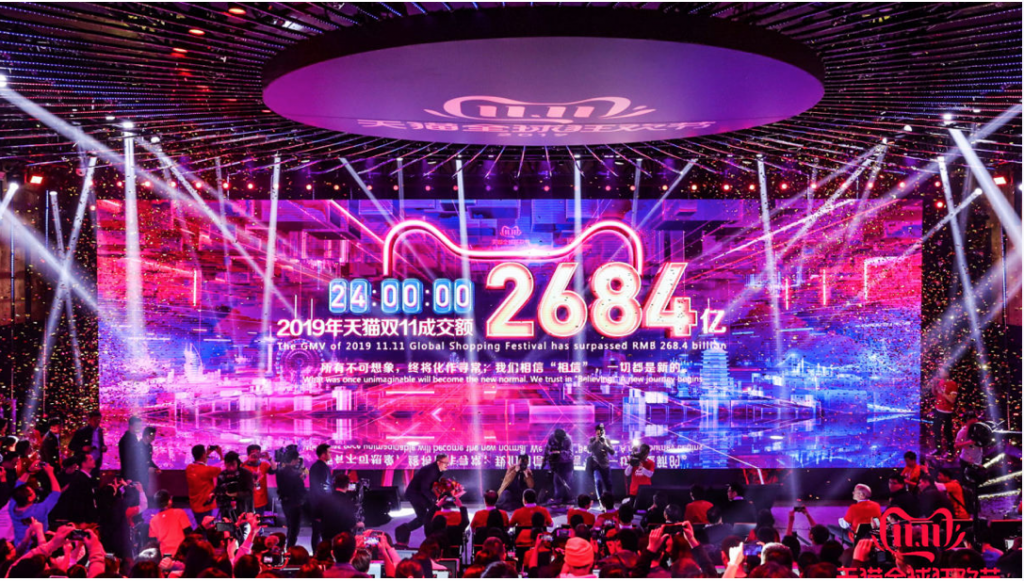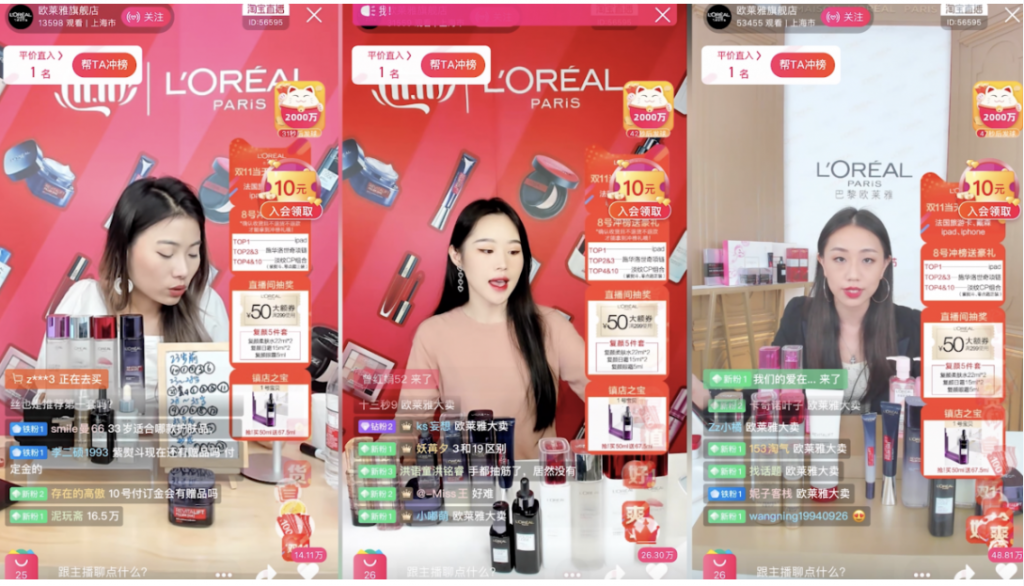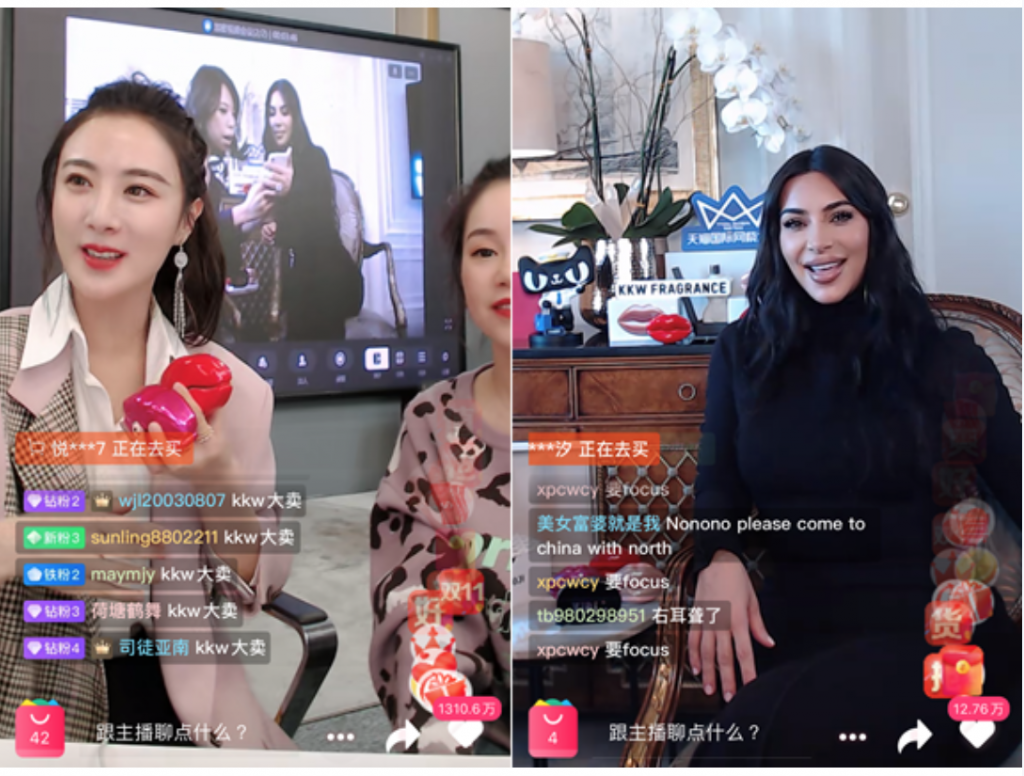Singles Day is the world largest online shopping day, eclipsing ‘Black Friday’, ‘Cyber Monday’ or the good old fashioned ‘January Sales’. But it’s about more than just shopping. Single’s Day has become an exhibition of ‘retailtainment’. For ten consecutive years, on every November 11th China has broadcasted its vision of e-commerce, and taking it further every single year.

Retailtainment, which has been defined by George Ritzer as ‘the use of sound, ambience, emotion and activity to get customers interested in the merchandise and in the mood to buy’, is at the forefront of Alibaba’s yearly event.
Branded as ‘Single’s Day’ in English, a closer translation would be Double 11 (双11). It is said that the tradition started in 1993 when four single Nanjing University students took this date as a day to, sadly, celebrate their celibacy. Little did they know that years later, in 2009, Daniel Zhang from Alibaba would use this date as a shopping festival that is celebrated by everyone, not only single people.
This year, the 24 hour event was totting up 544,000 orders per seconds at peak times on Tmall. The number of delivery orders exceeded one billion after 16 hours. Alibaba stated that they reached 268.4 RMB million of gross merchandise volume (GMV) (US$ 38.4 Billion) and seen 26% year-on-year growth.
But how can the craziness and the success of Single’s Day be explained? One point is clear, Alibaba managed to combine retail with entertainment which makes this event a day of shopping and of celebration.
Alibaba and its platform Taobao pushed one strong tool: livestreaming. Understanding that livestreaming is already big in China, they combined it with the craziness of Double 11 and the reach and engagement of some of the world’s biggest online influencers (Key Opinions Leaders, 网红) to drive consumer excitement around the exclusive discounts on offer. This heady combination of entertainment, retail and discount, soon saw users hooked and wanting to buy.
As Mark Tanner from China Skinny puts it: ‘Livestreaming is popular as it plays on the long popular theme of TV shopping, but in a much more interactive and entertaining way.” Senior analyst Wang Xiaofeng from Forrester Research also recognizes the strength of livestreaming “Recommendations from KOLs and real-time comments from peers helped consumers make purchase decisions faster. Livestreaming sessions often include exclusive limited-number and limited-time offers that create urgency to buy.”
Forrester Research has estimated that more than 17,000 brands participated in live streaming on 11.11 this year, with many Western brands now counted among them. One prime example is L’Oreal which expanded its KOL team in preparation for the event and streamed for 24 hours nonstop.

Key Opinion Leaders are a vital part of the livestreaming industry with viewers relying on their recommendations to buy. The power of livestream in China has not gone unnoticed by global influencers with the likes of Kim Kardashian West also participating in a livestream ahead of 11.11. During the stream, she interacted with a Chinese influencer called Viya Huang (a KOL to be reckon with since she sold 49.7 million USD in a single day).

However, Livestreaming represents only one segment of Alibaba’s ‘retailtainment’. Lazada, an Alibaba subsidiary, added gaming to the 11.11 success formula with people playing Moji-go and LazCity Wonderland games winning vouchers at the end of the game.
According to Alibaba, Single’s Day is a day to be celebrated and so a countdown has to be held. This year’s event included performances from Taylor Swift, the superstar G.E.M, piano virtuous Lang Lang, Japanese singer Kana Hanazawa, Lay from K-pop band EXO and Jackson Yee from C-pop group TF Boys. Previous years the gala has welcomed Mariah Carey and Pharell Williams.
But, with brands making significant investments in events and influencers, have they seen the results? In short, emphatically yes. Alibaba’s ‘retailtainment’ formula has delivered with its main livestream event generating 1.46Billion USD on Tmall only in 1minute 36.
The event touched every single domain of Alibaba’s offering. An 11.11 discount could be found in every area of business, from tech products, to cosmetics and B2B solutions. Indeed, Huawei’s total sales this year on Tmall exceeded last year’s full day sales in the first 30 minutes.
By segmenting its audience and satisfying every group, Alibaba found the way to make its 11.11 shopping festival the world largest shopping day, surpassing Black Friday and Cyber Monday.
With its unique formula, Alibaba created an event with a global impact in which brands from all over the world could participate. China Internet Watch reveals that Apple’s iPhone 11 broke 100 million yuan in sales in 1 minute. Apple’s transactions exceeded 7 times of last year’s full day sales.
With such economic power, it’s no surprise that Single’s Day is not a China-only event anymore. Double 11 has had an impact across the e-commerce industry. Amazon readapted the concept, FlipKart in India, Qoo10 in Singapore and 11th Street in South Korea also offer promotions on 11.11.
Alibaba is changing the rules of e-commerce with this yearly event. By combining innovation, technology with entertainment the group is pushing the boundaries of ‘retailtainment.’

If your company wants to understand the Chinese market more, please contact us at hello@temono.com




